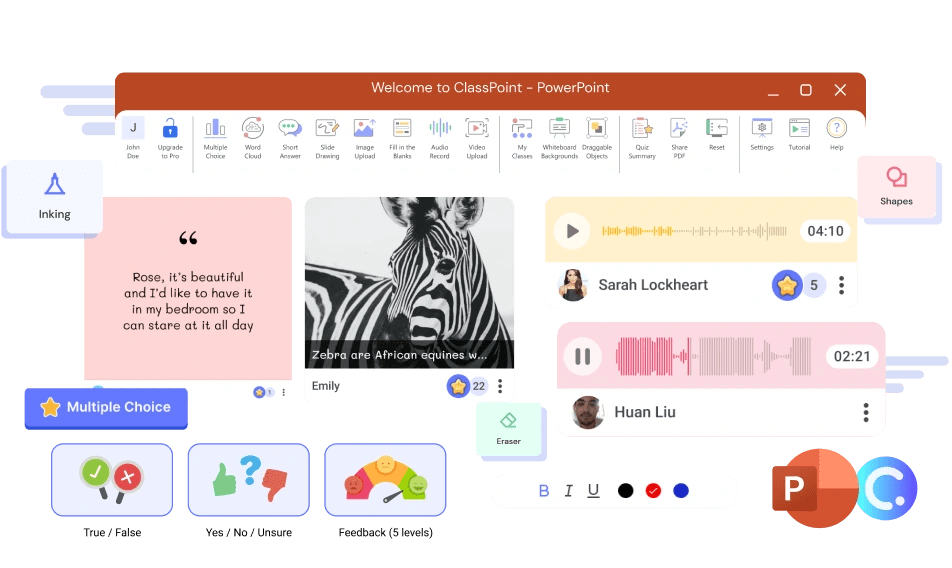From tech being seen as a mere distraction in class to becoming the lifeline for teaching during in-person restrictions, EdTech and student engagement have been on a rollercoaster over the past few years. And as both students and education continue to evolve, engaging students may always be a challenge with each new year, even day.
But with all challenges comes opportunity; and the creative EdTech industry has taken it upon itself to offer ideas, tools, and solutions to help engage students in the classroom both online and in person. This brings us here, to 5 EdTech ideas you can use to better engage your students along with examples & tools to try.
Tip 1: Get Students to Create

With an abundance of EdTech tools & resources out there to use for teaching & learning, jump into the creativity madness and get students to use them to create!
Head to your computer lab and have students create media – a graphic design, a comic, a video, a game, a website, or an interactive presentation – as a display of their understanding. Getting creative in the mediums that students use can of course allow for student creativity, but it is also an opportunity for them to process your material in diverse ways.
There are also plenty of easy tools you can use as an in-class activity to get students to create such as Flip, an effortless video-making tool for students that matches the short video style used on social media platforms. There are countless creative ways to get students to reproduce their student learning objectives that you should take advantage of, and EdTech is still uncovering them.
Read Next: 4 Ways to use Flipgrid and ClassPoint in your lessons
Tip 2: Use Annotation and Whiteboard Tools
From blackboards to smart boards to collaborative online tools, the concept of annotating, note-taking, and drawing to facilitate learning is somewhat unchanged, except for obviously, the medium, and the advancements in technology. But that being said, this one is important because these newer advanced tools have taken annotating and whiteboarding to another level, and you don’t want to sleep on it.
First, you can use advanced annotation tools such as smart whiteboards or ClassPoint within PowerPoint, to annotate your presentations or material while you are teaching in class. If you are online teaching, you may not have a whiteboard or smartboard in front of your class, so annotating on your slides to keep students engaged in your content while you are screen sharing!
Second, you should try out digital whiteboard tools, such as Microsoft Whiteboard or whiteboarding in your PowerPoint presentation, that auto-save, provide templates, have design tools, and allow for real-time collaboration and file organization that are comprehensive, yet user-friendly.
Read Next: Using The One By Wacom For Online Teaching With PowerPoint
Tips 3: Have Students Collaborate

Increase students learning value by making learning social. When students collaborate with each other, they can learn with and from each other, learning more things than just their course material (like life skills). And with tech, there is an abundance of collaboration tools to make group work easier and more reliable.
Use tools such as Wakelet, Classcraft, or even just Google Drive as a platform for collaborating. When students share materials, exchange notes & feedback, and produce something together, they get the opportunity to use their voices! If you are online teaching, use Breakout Rooms for group activities, they can work in small groups and then come back as a whole class in one session.
Read Next: How To Use ClassPoint Quizzes As A Student Collaboration Tool
Tip 4: Use Interactive Questions & Polls

Student response systems are a brilliant and nearly effortless way to get students immediately involved in your lessons. Use interactive activity questions to engage students, quiz questions to get them to recall their learning objectives, or polls to get students to share their opinions. Not only are these two-way communication activities a method to engage students, but it’s also a method for gaining feedback on their progress, understanding, or emotions.
Interactive student response questions can be used for ice-breakers, check-for-understanding points, in-class activities, or exit tickets! If you use Powerpoint, ClassPoint’s interactive questions can be easily added right to your slides! There are also plenty of student response tools such as Kahoot that you can find on the web.
Read Next: How To Make An Interactive Quiz In PowerPoint In Less Than 1 Minute
Tip 5: Gamify your lessons!

Think PowerPoint Jeopardy, but scratch the prep work, and increase the relatability. Gamification, combining game-based entertainment with education, might be the main course that EdTech has brought to the table. Gamification is an incredibly powerful tool in student motivation as well as making elements of your lesson relatable and engaging for students.
You can think big picture and create a classroom leaderboard where students gain points or progress toward a level by completing tasks or learning quests, participating in class, or doing extra credit. Or you can have fun with one unit and play quiz games such as ClassPoint’s competition mode that will score and rank students as they race to answer your quiz questions. Or you can run game-based activities such as scavenger hunts or literal games that combine your student’s learning objectives with a video game objective.
Read Next: 4 Classroom Gamification Elements And Examples
With so many different EdTech tools out in the world, every teacher has their own personal favorites. What are a few of yours?